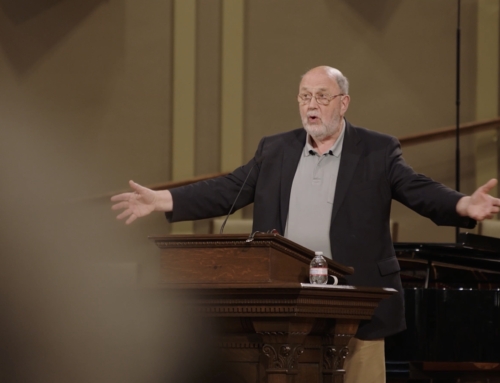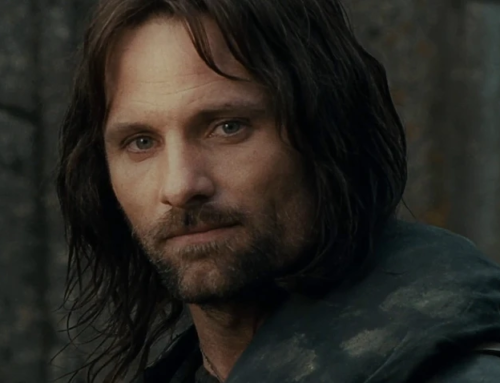The contrast couldn’t be more dramatic. The train ride north from Edinburgh to Aberdeen followed the storm called ‘The Beast from the East’. A mixture of snow and rain accompanied me as I walked to the train station in Edinburgh. Slush occasionally caught my luggage, making it a miserable journey.
The journey north provided a view I hardly expected. In fact, most of the Scottish people I met commented that they had never seen anything like this. Piles of snow, power outages, and villages cut off from services due to snowdrifts six to eight feet high. Gloom and ugly fog mixed with mist was the scene out my window.
I was on my way to Aberdeen, Scotland, to hear Professor N.T. Wright deliver the prestigious Gifford Lectures, dedicated to exploring the topic of Natural Theology. In short, the topic of Natural Theology is the study of God based on the observation of nature, as distinct from ‘supernatural’ or revealed theology, which is based on special revelation. Because observing nature is an intellectual pursuit, natural theology involves human philosophy and reasoning as means of knowing God.
Prof. Wright was asked to deliver the annual lectures, eight of them over a period of four weeks. Suffice it to say that it was a burden he carried for at least two years. The last time a New Testament scholar was asked to deliver the lectures was in 1955 when Rudolf Bultmann rose to the task. Much has changed since then, both in society and in the area of New Testament studies.
As I write, the scenery from the train back to Edinburgh has also changed. Brilliant sunshine illuminates the railcar with various shades of green out the window. There are few dreary remnants of the Beast from the East just three days ago. The train hugs the coast of northern Scotland so that, in addition to the green fields, the brilliant blue ocean images amaze the eyes. The highlands in the distance keep the snow in mind, but that is usual up here. There is so much beauty on the trip back, a big change from the gloom on the way up.
Prof. Wright launched his concluding lecture, reflecting on the foundations of the previous seven lectures. As I read the previous lectures, I witnessed some of the ‘gloom’ of previous lecturers, who pondered the Scriptures, and the world, in past generations. I read of the Lisbon earthquake on November 1st, at 9:40 AM in Portugal.
It was All Saints Day, 1755 A.D. Most people were in churches that crumbled as a result of the massive tremors, estimated to be 8.5 to 9.0 on the Richter scale. Nearly 50,000 people died. How could it be possible to believe in a good God hovering over creation? Some call this the beginning of the march to atheism in Europe. God had failed. Or had He? Discussions of Natural Theology suddenly took a turn towards fatalistic skepticism, with various philosophies filling the gap, that appeared when ‘God’ could no longer be trusted to take care of things on earth.
Much thinking and writing has come and gone since that day. In many ways, the competing ancient philosophies—Epicurean, Stoic, Platonic—seemed like more trusted alternatives to Christianity. In fact, however, such philosophies had already infiltrated the thinking of most Christians over the centuries, so that what resulted was a polluted well rather than the wellspring of life of which Jesus spoke.
And so, as I write this with the gleaming sunshine highlighting the beauty of creation, I ponder what Prof. Wright suggested, in thinking of Natural Theology in a new way.
Prof. Wright’s final lecture began:
The world is charged with the grandeur of God.
It will flame out, like shining from shook foil;
It gathers to a greatness, like the ooze of oil
Crushed.
Gerard Manley Hopkins’s extraordinary sonnet tells us almost everything I want to say this evening in drawing these lectures together. The poem not only articulates the victory of new creation over the forces that corrupt the old; it embodies that victory by creating a fresh artistic beauty that symbolizes the beauty it describes.
This brings me to what Prof. Wright proposes in his seventh lecture: that there are signposts, albeit broken ones, which point in the present world to the ‘vocations’ for human beings. Most people in most cultures discern these seven signposts:
The Vocational Signposts
The seven are Justice, Beauty, Freedom, Truth and Power, Spirituality and Relationships. Click To TweetThere are seven features of human life, which can be observed across different societies and times. I name these ‘vocations’, though they are often present as inarticulate aspirations and impulsions. We know them in our bones….
The seven are Justice, Beauty, Freedom, Truth and Power, Spirituality and Relationships. Our modern word ‘religion’ doesn’t get near this complex of categories, which may be why many today leave ‘religion’ alone. The point about all seven, to put it crudely, is that we all know they matter but we all have trouble with them.
With the beauty outside my window and the inner sense of beautiful moments in past memories, I know they matter. Consider beauty. As Prof. Wright suggests:
Whether it’s a sunset or a symphony, the smile of a child or bunch of spring flowers, beauty makes us more alive. We know it matters. If you live in a prison cell, or the corporate prison cells of the brutalist buildings in old Eastern Europe, the stripping away of beauty is dehumanising. But, as with justice, even when we celebrate and relish beauty, it doesn’t last. The sunset fades. The smiling child becomes a bitter adult. The flowers wither. The music stops. The darkness closes in, making us wonder if what we thought was delight was a random evolutionary quirk, a vestige of ancestral needs, or whether, still worse, Sartre was right and the whole thing is a sick joke at our expense. We are drawn to beauty as to a magnet, but it disappears like a mirage. Why?
The human vocation, the calling of humanity, is to be about the restoration of these seven signposts. In so doing, we become New Creation people. These ‘Vocations’ are ways forward; ways to focus on what may have been lost through the previous centuries’ twists and turns. The Church itself has gotten lost and has absorbed the prevailing atmosphere of Epicurean and Platonic thought. It doesn’t work to care only about ‘our heavenly home’, which is more Plato than Christian. No, the Christian is about living out the vocation, bringing beauty and noting it whenever possible. That is just one calling among the seven that Prof. Wright suggests.
As I write this, the beauty around me is inescapable and it calls forth the sense of ‘the grandeur of God’. Have we become too busy to see it? Have we become so pragmatic in our churches that we are more about ‘church tasks’ and in the process have we forgotten our calling? Perhaps the ‘Seven Signposts’ have never been discussed in your circle of influence. Maybe it is time to do so.
A Postscript: I am reminded of a trip my wife and I took to Vancouver, British Columbia. It was my goal to visit James Houston and spend time talking to him. He was one of the driving forces behind the founding of Regent College. His wife, Rita, was a wonderful host to us. She also gently scolded me about how my wife, who was off to see Butchart Gardens, on Vancouver Island, made the better choice than I, who wanted to talk about theology. She said there is much to be learned out in the gardens that you won’t get in books. While James Houston and I had a delightful time, I now wonder what I lost in choosing to be inside rather than observing the beauty of the exquisite gardens just a ferry ride away.
David P. Seemuth, PhD
Latest posts by David P. Seemuth, PhD (see all)
- Advent Reflections from the N.T. Wright Online Team - December 5, 2022
- YouTube as Public Reading of Scripture - August 29, 2022
- What I Learned From A Week With Professor Wright - June 16, 2022







